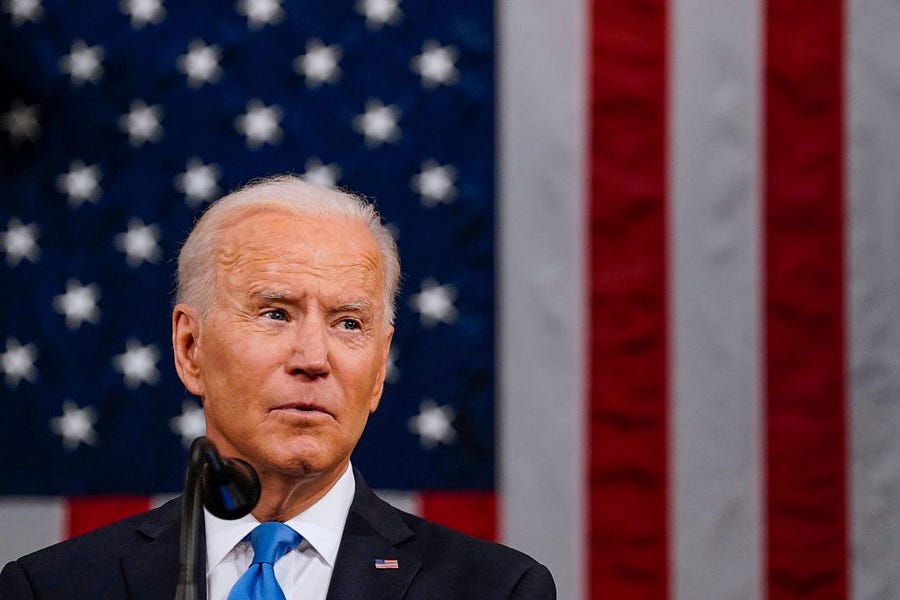Joe Biden didn’t just campaign as a moderate. He signaled again and again that he would be an affable placeholder president who’d clean up the messes created by his opponent, mend some fences with allies and get the pandemic under control.
“Look, I view myself as a bridge, not as anything else,” Biden said not long after essentially locking up the Democratic nomination on Super Tuesday.
Referring to some of the younger candidates he beat in the primary, he said, “There’s an entire generation of leaders you saw stand behind me. They are the future of this country.”
The point of such gestures was to reassure the Democratic base that there was a reason to back him, not least because he’d pick someone more progressive as his running mate.
This messaging had the extra advantage of implicitly reassuring independents, moderates and anti-Trump Republicans. In effect, Biden was saying, “Look, I’ve got to bring the hotheads along for the ride, but don’t worry: A vote for me isn’t a vote for that Bernie Sanders stuff.”
Biden’s more explicit appeal to these voters was that he would reach across the aisle. “I know how to go toe-to-toe with the GOP, but it doesn’t have to be and it can’t be that way on every issue,” he said at a Philadelphia rally in May 2020.
In the Cleveland debate, Donald Trump accused Biden of wanting socialized medicine. Biden said that was a “lie,” adding, “The party is me. Right now, I am the Democratic Party.” In other words, don’t pay attention to those guys. “The platform of the Democratic Party is what I, in fact, approved of,” he explained.
According to most Republicans and right-wing pundits, this was always a lie, and Biden’s first 100 days prove it. He promised to unite the country, they say with almost metronomic regularity, and now he’s dividing the country with his radical agenda. This week’s address to Congress, with its trillions upon trillions of dollars’ worth of new spending on cradle-to-grave social welfare programs and infrastructure made that abundantly clear.
The Republican critique is eminently plausible. The central argument of the Trump campaign — to the extent that it made arguments — was that Biden’s moderation was either a ruse or irrelevant because he would be a pushover for his party. If you start from that assumption, saying “I told you so” seems reasonable.
And they may be right.
But there’s another possibility. A.B. Stoddard of RealClearPolitics, one of the best political analysts in the business, argued on a recent episode of my podcast, The Remnant, that the Biden team always assumed it wouldn’t have control of the Senate. Georgia had a runoff election for two seats. The Republicans needed to win only one to hold onto the Senate—which most observers in both parties thought was all but assured. But largely because of Trump’s tantrums about losing Georgia in the presidential election, many natural Republican voters refused to vote.
“Telling everyone that the race was stolen when it wasn’t cost the Republicans two Senate seats,” said Erick Erickson, a Georgia-based conservative radio host, echoing the conclusions of many Republican and Democratic strategists alike.
My point isn’t that Trump is to blame for what Biden is doing now. It’s simply that Biden’s push for an almost New Deal-level of government activism might not have been his plan. He stumbled into an opportunity and he’s seizing it. His breakneck pace stems in part from the belief that Democratic unified control of government won’t last past the midterms (or even one Senate death or early retirement), so the Dems need to swing for the fences while they can.
In one sense, this is vindication for the “I told you so” Republicans. It’s also an illustration of crystalline purity that elections have consequences.
And it’s a useful reminder that our system doesn’t assume politicians are bipartisan by conviction. Rather, our Madisonian structure of checks and balances was intended to force compromise. If the GOP held the Senate, Biden might have been the guy he said he’d be, not because he wanted to, but because he’d have no choice.
But because both parties—and many presidents, Biden included—cling to the idea that you have to grab everything while you can, we’re witnessing the biggest overreach in my lifetime.
A test of this theory may come soon enough. If the GOP takes back the House or Senate, Biden may try to revert to the bipartisanship he promised, which will be cold comfort to those of us who don’t think we can afford what he’s doing now.







Please note that we at The Dispatch hold ourselves, our work, and our commenters to a higher standard than other places on the internet. We welcome comments that foster genuine debate or discussion—including comments critical of us or our work—but responses that include ad hominem attacks on fellow Dispatch members or are intended to stoke fear and anger may be moderated.
With your membership, you only have the ability to comment on The Morning Dispatch articles. Consider upgrading to join the conversation everywhere.